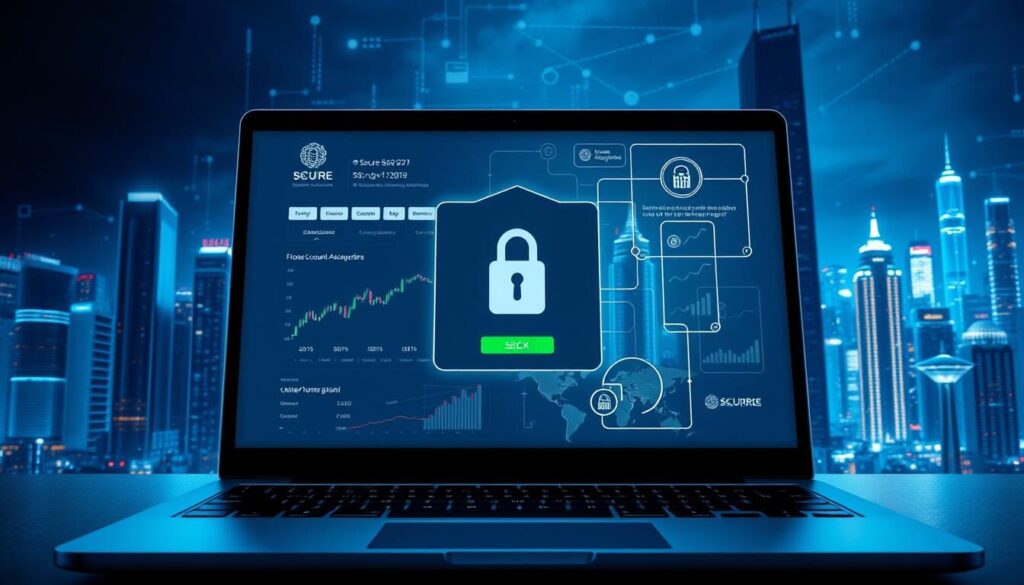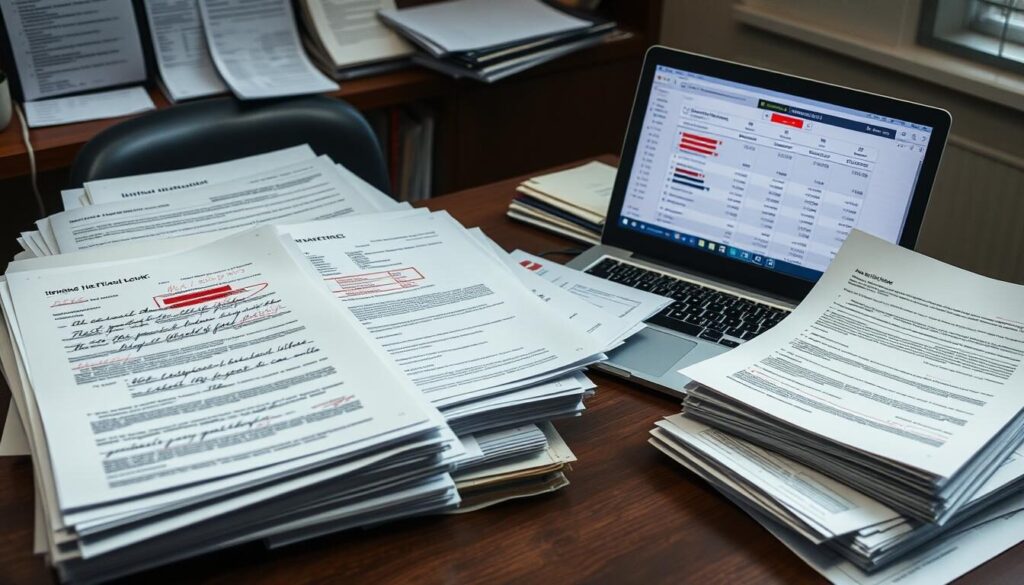Ever felt that sinking feeling when your forex trading account balance drops faster than a poorly timed meme stock? What if the problem isn’t the market—it’s your broker? Many traders don’t realize they’ve been played until it’s too late. But here’s the twist: you’re not powerless.
Time is your secret weapon here. Like hitting pause on a bad movie before the plot gets worse, stopping transactions immediately can prevent deeper losses. Gather every email, screenshot, and contract—even that vague promise they made in a chat. Think of it like untangling headphone wires: messy at first, but each strand matters.
Forex markets move fast, and so should you. Real cases show recovery is possible, but only with a clear roadmap. Legal experts and financial recovery pros act like GPS for your case—they know shortcuts you don’t. And while no one plans for this scenario, preparation separates the “I wish I had” stories from the “glad I did” ones.
Key Takeaways
- Act fast to freeze transactions and limit financial damage.
- Document every interaction—details make or break your case.
- Specialized experts streamline the recovery process.
- Forex risks multiply with unregulated brokers.
- Recovery isn’t guaranteed, but organized steps improve odds.
Understanding Forex Broker Scams
You know that moment in a thriller when the music swells right before the trap snaps shut? That’s how many traders describe realizing they’ve been duped. These schemes thrive on market chaos—like pickpockets working a crowded subway.
Common Scam Tactics in Forex Trading
Fraudsters play three-card monte with your money. Their favorite moves:
- “Double your account in 30 days!” promises (spoiler: math doesn’t work that way)
- Fake urgency: “This offer expires in 2 hours!”
- Regulatory theater—flashy logos copied from real agencies
| Tactic | Scam Version | Legitimate Practice |
|---|---|---|
| Promises | Guaranteed 100% returns | Clear market risk warnings |
| Communication | Vague contract terms | Transparent fee structures |
| Urgency | “Act now or miss out!” | No pressure to deposit |
How Scammers Lure Traders
Ever gotten a DM from someone claiming they’ve cracked the market code? These operators weaponize FOMO better than a Black Friday sale. They’ll name-drop fake clients or mimic real broker interfaces—like a counterfeit Rolex that ticks until it doesn’t.
Here’s the kicker: 30% of forex complaints involve unregulated platforms. They’re the financial equivalent of a wolf in sheep’s clothing, using psychological triggers (fear of missing gains, panic about losses) to override logic. Remember—if it feels like a casino rigged in the house’s favor, it probably is.
Recognizing the Warning Signs of a Scam
Ever had a “this seems off” moment you brushed aside? That’s exactly what fraudsters bank on. Spotting shady moves early is like catching a typo in a contract—annoying now, catastrophic later. Let’s break down the breadcrumbs brokers leave before vanishing with your funds.
Red Flags in Trading Practices
If promises sound like infomercial pitches—run. Real traders know markets have bad days, but scammers sell rainbows. Watch for:
- “Risk-free investment” claims (spoiler: risk-free doesn’t exist)
- Fees that appear like magic mushrooms after deposits
- Withdrawal delays longer than DMV lines
Take the case of a trader who noticed 12% “processing fees” on withdrawals. Legit platforms? Clear costs upfront—no surprises.
Indicators of Unethical Broker Behavior
Ever played phone tag with customer service? Dodgy brokers treat answers like state secrets. Key tells:
| Ethical | Unethical |
|---|---|
| Same-day email replies | Radio silence for weeks |
| Detailed fee breakdowns | “Miscellaneous charges” with zero explanation |
Trust that gut feeling—it’s your built-in scam detector. Always verify regulatory status through official databases. Because in finance, “trust but verify” isn’t just a saying—it’s armor.
Immediate Steps to Protect Your Funds

Picture this: Your phone buzzes with a suspicious withdrawal alert. That’s your financial fire alarm—pull the lever now. Acting within the first 24 hours can mean the difference between a close call and total meltdown. Here’s your playbook for damage control.
Freeze Frame
Stop. Everything. Like hitting emergency brakes on a runaway train:
- Cancel pending trades through your platform’s interface
- Disconnect payment methods (credit cards, e-wallets)
- Change passwords using 12+ character phrases—no pet names
One trader froze their account mid-“margin call” and saved $8k. Scammers thrive on hesitation—don’t gift them extra innings.
Paper Trail Protocol
Gather information like you’re prepping for court:
- Screenshot transaction histories
- Export chat logs with support teams
- Save promotional materials with wild promises
Regulatory authorities need concrete proof, not “they seemed sketchy” stories. Think of it as building a fraud piñata—the more documentation you stuff inside, the sweeter the payoff when it breaks open.
| Action | Result |
|---|---|
| Immediate account freeze | Halts further withdrawals |
| Password reset | Blocks unauthorized access |
| Bank notification | Triggers fraud investigations |
Remember: Your experience matters. One client’s detailed timeline helped regulators shut down a $2M operation. Every email timestamp and deposit receipt becomes ammunition against financial predators.
How to get help after being scammed by a forex broker

Ever tried solving a mystery without clues? That’s what fighting financial fraud feels like without evidence. Your paper trail becomes Sherlock Holmes’ magnifying glass—every detail matters.
Evidence: Your New Best Friend
Treat documentation like dating app screenshots—save everything. Those “guaranteed returns” emails? Screenshot them mid-swipe. Chat logs where support ghosts you? Export faster than deleting cringe texts.
- Create labeled folders: “Promises vs Reality” / “Fee Surprises”
- Timestamp entries like a courtroom stenographer
- Backup to cloud storage (because sticky notes burn)
| Strong Evidence | Weak Evidence |
|---|---|
| Dated transaction records | “They sounded shady” |
| Original contract PDFs | Hearsay from forums |
Transaction Freeze: Financial Quarantine
When red flags wave, hit pause like Netflix buffering. Three emergency moves:
- Change passwords using random phrases—“PurpleTiger$Eats3Pancakes” beats “Password123”
- Freeze accounts through your bank’s fraud department
- Alert payment processors—they’re bouncers for your money
One investor stopped $15k from vanishing by freezing transfers during “maintenance delays.” Remember: Scammers hate paper trails more than vampires hate garlic. Your organized process becomes kryptonite to their schemes.
Legal Resources and Recovery of Funds

Imagine your savings vanishing into digital thin air—then discovering there’s a SWAT team for financial crimes. Recovery experts operate like tech support for your bank account, armed with subpoenas instead of screwdrivers. Their playbook? International law loopholes and blockchain breadcrumbs.
Contacting Financial Recovery Experts
Think of these pros as multilingual negotiators who speak both legalese and trader slang. Start with three moves:
- Request case studies showing individuals who did get money back
- Ask about cross-border success rates (one firm recovered €400k from offshore accounts)
- Verify credentials through regulatory databases
One trader reclaimed 80% of lost funds by hiring specialists within 72 hours. Time matters more than you think.
Understanding Your Legal Rights and Options
Your rights aren’t buried in fine print—they’re shields waiting to be wielded. Regulatory bodies like the FCA and ASIC force companies to maintain compensation schemes. Key questions for legal counsel:
- “What jurisdiction applies to my trades?” (Hint: Where their servers live)
- “Can we freeze assets before they’re moved?”
- “What’s the realistic timeline?”
In 2021, a group of individuals sued a broker across three countries—and won. The world of finance has more guardrails than you’d guess. Remember: Even David had a sling.
How to Protect Yourself Against Future Scams
Ever bought concert tickets from a guy in a parking lot? Choosing a forex broker without research feels riskier. The market’s full of wolves wearing sheep emojis—your job is to spot the fakes before they fleece you.
Vetting Forex Brokers Thoroughly
Treat broker selection like online dating—swipe left on anyone who oversells. Legit platforms won’t promise moon tickets. Three non-negotiable checks:
- Regulatory status (search official databases like NFA or FCA)
- User reviews on trusted sites—ignore 5-star gushfests
- Transparent fee breakdowns without “miscellaneous” surprises
| Shady Broker | Legit Broker |
|---|---|
| “No losses guaranteed!” | “Past performance ≠ future results” |
| Offshore registration | Licensed in your country |
Implementing Essential Safety Practices
Your trading account needs more protection than a TikTok profile. Start here:
- Use 2FA like it’s sunscreen—non-negotiable
- Update passwords quarterly (think phrase not word)
- Bookmark regulatory alert pages—they’re the fraud radar
Join forums where traders share horror stories. One Reddit thread recently exposed a clone site mimicking a major forex broker. Remember: Scammers update tactics faster than iOS—stay sharper.
Set Google alerts for “trading scams” in your region. When a new scheme pops up, you’ll know before your morning coffee cools. Because in finance, paranoia isn’t a weakness—it’s armor.
Utilizing Support Networks and Professional Assistance
Ever stood in a crowded room screaming into silence? That’s financial fraud—isolating even when surrounded. But here’s the plot twist: communities exist where your voice becomes a megaphone. Shared pain fuels collective power.
Connecting with Peer Support and Forums
Think of online groups as group chats that actually help. Reddit’s r/Forex and specialized forums buzz with survivors swapping tactics. Benefits stack fast:
- Moral support from those who’ve walked your path
- Practical hacks like “how I recovered 40% through small claims”
- Early warnings about new scam patterns
One trader discovered three other victims in a Telegram group—pooling evidence led to a class action. Your story could be the missing puzzle piece for someone else’s case.
| Strong Moves | Weak Moves |
|---|---|
| Documenting interactions daily | Venting without action |
| Sharing broker screenshots | Trusting anonymous “recovery gurus” |
Professional help? Think financial detectives. Certified recovery experts track hidden assets like bloodhounds. Steps take shape when you combine crowd wisdom with legal muscle. Remember: Scammers hate sunlight. Your shared truth shines brighter.
While forums can’t get money back magically, they’re launchpads for action. One thread recently exposed a “profit recovery” scam targeting victims—proof that knowledge spreads faster than lies. Post your story. Someone’s waiting to say “me too”—and together, you’ll write the next chapter.
The Role of Regulatory Bodies in Recovering Your Funds
Think of financial watchdogs as referees in a rigged game—they’ll blow the whistle when players cheat. Agencies like the CFTC and FCA don’t just set rules; they’ve got action teams ready to tackle fraud. Your complaint becomes evidence in their playbook to penalize shady operators.
Filing Complaints That Actually Stick
Submitting reports isn’t paperwork—it’s financial counterpunching. Follow this play-by-play:
- Locate your broker’s regulator using official databases
- Package evidence like a prosecutor: timestamps, screenshots, bank statements
- Cite specific violations (e.g., “Section 5b of Commodity Exchange Act”)
One victim recovered $12k after the FCA froze their broker’s assets within 48 hours. Your knowledge of regulations turns complaints into weapons.
Turning Accountability Into Action
Regulators aren’t toothless—they’re demolition crews for financial traps. Recent cases show:
| Effective Moves | Paper Tigers |
|---|---|
| ASIC banning 14 firms in 2023 | Vague “we’ll investigate” promises |
| CFTC clawing back $3B since 2020 | Unverified broker reviews |
Your detailed exchange history with the broker? That’s jet fuel for investigations. Share every odd fee and broken promise—regulators connect dots you can’t see.
Remember: Reporting does more than maybe get your cash back. It slams doors on future scams. When 100 victims speak up, agencies shift from “case file” to “crisis mode.” Your action protects the next trader from your nightmare.
Conclusion
Rebuilding after financial betrayal feels like piecing together a shattered vase—messy, but possible. Every documented chat log and frozen transaction becomes glue for your recovery. Systematic action turns panic into progress.
Remember: Quick moves protect your bank balance faster than market swings. Evidence collection? It’s your shield against empty promises of returns. Legal experts decode regulations like translators at the UN—they find paths you’d miss alone.
While losses sting, they’re not final. Regulatory bodies dismantle schemes daily, and step-by-step guides turn confusion into clarity. Think of this process as reprogramming faulty software—tedious updates lead to smoother operations.
Stay sharper than a crypto meme’s punchline. Verify currency platforms like you’d inspect a used car—kicking tires matters. Your next trade isn’t just about profits; it’s proof that resilience outlasts scams.
Here’s the secret survivors know: Knowledge isn’t just power—it’s currency. You’ve got the tools. Now rewrite the story.
